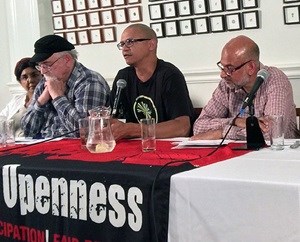If you thought the murder of French media workers had little impact on the South African media landscape, Right2Know suggests you think again - prepare to take action with your pens and laptops...
Nothing makes you fear for the future more than a threat to your freedom - any form of freedom. And nothing gets the dissenters talking more than a threat to media freedom. That's why Wednesday, 21 January 2015, just two weeks after the offices of satirical magazine Charlie Hebdo were stormed in France, saw South African Right2Know hosting an evening discussion session on media freedom at 6 Spin Street.

L to R: Media veteran Zubeida Jaffer; journalist Terry Bell; Brandan Reynolds, Argus cartoonist; Farid Sayed, Muslim Views editor.
Speakers included Farid Sayed, Muslim Views editor; as well as Brandan Reynolds, Argus cartoonist; journalist Terry Bell; and media veteran Zubeida Jaffer. They spoke of how the aftermath of the recent Charlie Hebdo murders in France raised difficult but important questions about the challenges to and even place of media freedom, especially in the context of social and political polarisation and unequal power, which is unfortunately prevalent in the media.
Right2Know's national coordinator Mark Wynberg contextualised the talk as an important discussion due to the need for openness and transparency and to condemn any and all attacks on whistleblowers and media workers. He said that the bombing of TV stations in the Middle East, journalists' beheadings and the most top-of-mind France attacks have thrown up some controversies to be better understood, mainly on how we understand freedom of expression. As an example, he spoke of Copernicus shaking the social establishment at the time by being told to recant for having the audacity to suggest the Earth is round. He asks if there are reasonable limits to freedom of expression, and whether we should rather be tolerant - especially of religion - and not rock the boat. He also spoke of the need to enable diversity of media and continue the fight for true democracy before introducing the panel.
Not all media killings are accounted for - not by a long shot
Sayed, Reynolds, Bell and Jaffer each had 10 minutes. Sayed started off by calling the Charlie Hebdo murder a sickening crime that needs worldwide condemnation. That said, we can't afford to merely be reactionary. Sayed said even his participation in the debate was questioned on Facebook as being non-progressive. He said there's been a long history of the silencing and slaughter of media journalists, but the media hasn't been raising its voice often enough in the past. We need to ensure journalists can do their work in a safe environment, free from fear of harassment, injury or death. Who are the real victims of terror and the war on terror, he questioned...
Reynolds then spoke of his personal experience and the way the events of the past few weeks have opened up fault lines. Key among them was the fact that he is a cartoonist, and a South African cartoonist at that. He explained that the call a few years ago on social media for cartoonists to depict the Prophet made no sense to him, and made him question what good would come of it.
Bell: It's a rotten form of freedom...
Next, Bell said he was bugged by superficial issues being in the public domain that shouldn't be there, purely due to media coverage and agenda, and said that as an extreme democrat, he feels everyone should be allowed to do "what they damn well please," provided it doesn't impact negatively on anyone else. He says what should have been highlighted with the Charlie Hebdo attack was the hypocrisy of the world leaders who spoke out against the attack on media freedom, despite many of them detaining journalists in their own countries. We can't be closed-minded, we need an understanding of the past to see why we are where we are at present and where we're going in future. But we shouldn't take things at face value either - we need to understand why the extremists actually exist and what got them to this point.
Are journalists adequately reporting on what's happening in the world?
Lastly, Jaffer spoke of how as journalists, the recent attacks have made us question our role and what we need to be conscious of. It's about being thoughtful and making sense of the world around you, not just entering the fray and creating confusion by not doing your research. We need to help society understand the issues and why they exist in the first place, not just report on the latest happenings in a sensationalist manner. Jaffer, who was herself detained in the past, feels South Africa is in a fortunate situation as the biggest challenge in the world at the moment is the necessary learning that we are actually all the same, we feel the same, hurt the same and want the same things - we have a head start in getting this right. The floor was then opened to questions from the audience.
The debate was crucial, especially now, as South Africa grapples with the value of freedom of expression, the right to dignity, and - perhaps especially - the need for honest dialogue in the context of massive inequality, racism, faltering social cohesion, increased repression and an untransformed media. For more, see the #r2kdebate hashtag on Twitter.





















































